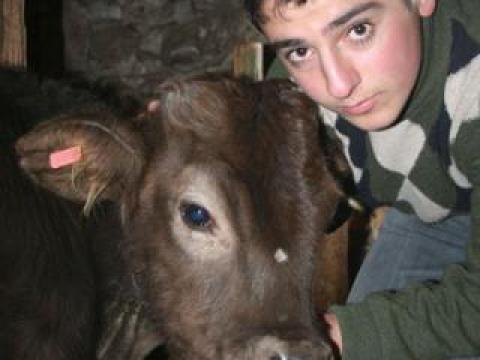Armenian teens get chance to start animal breeding on their own

To date 24 youngsters have each received a calf, which they are required to care for. While their regular schooling is a priority, they also acquire animal breeding skills and a greater sense of responsibility, as well as the experience of being a member of the club of young animal breeders.
“This project not only ensures that young boys and girls are busy and kept off the streets. It contributes to the development of independence and self-confidence among them, and also considerably eases the difficult social conditions of their families”, says Naira Chobanyan, the president of the club.
Being able to somehow contribute to their family and learning to do something independently is a good component of child education and development “Being able to somehow contribute to their family and learning to do something independently is a good component of child education and development”, she adds. “After all, these are skills they will very much need as they enter a more independent life”.
The project is implemented between World Vision Armenia and the Centre for Agribusiness and Rural Development (CARD). Along with the calves, youngsters also receive the necessary medicine and food for the animals, as well as educational materials.
Young animal breeders gather periodically in the club to learn about how to take care of the calves – knowledge that they in turn pass on to their parents and other family members and friends.
You just feel responsible for the animal you have tamed Karen Jilabyan, 13, is one of the Agarak Village youngsters who has received a calf. He says the little calf has totally changed his life. “Every day I wake up earlier to feed him. When I come home from my classes, I spend another couple of hours with him. It takes me a while to take care of him, but I am so happy I have a calf of my own”, he says.
“I have become much more disciplined than I was before”, says Gurgen Chatinyan, 14, who has also received a calf. “It is like a little pet, you should take care of it so that it doesn’t catch any disease, you should feed it and clean the cattle shed it lives in”, he explains. “You just feel responsible for the animal you have tamed”, Gurgen adds.
As the young beneficiaries gain more experience in animal breeding, they will prepare for an exhibition to take place where the project participants will be evaluated based on their achievements in animal breeding.
-Ends-
“This project not only ensures that young boys and girls are busy and kept off the streets. It contributes to the development of independence and self-confidence among them, and also considerably eases the difficult social conditions of their families”, says Naira Chobanyan, the president of the club.
Being able to somehow contribute to their family and learning to do something independently is a good component of child education and development “Being able to somehow contribute to their family and learning to do something independently is a good component of child education and development”, she adds. “After all, these are skills they will very much need as they enter a more independent life”.
The project is implemented between World Vision Armenia and the Centre for Agribusiness and Rural Development (CARD). Along with the calves, youngsters also receive the necessary medicine and food for the animals, as well as educational materials.
Young animal breeders gather periodically in the club to learn about how to take care of the calves – knowledge that they in turn pass on to their parents and other family members and friends.
You just feel responsible for the animal you have tamed Karen Jilabyan, 13, is one of the Agarak Village youngsters who has received a calf. He says the little calf has totally changed his life. “Every day I wake up earlier to feed him. When I come home from my classes, I spend another couple of hours with him. It takes me a while to take care of him, but I am so happy I have a calf of my own”, he says.
“I have become much more disciplined than I was before”, says Gurgen Chatinyan, 14, who has also received a calf. “It is like a little pet, you should take care of it so that it doesn’t catch any disease, you should feed it and clean the cattle shed it lives in”, he explains. “You just feel responsible for the animal you have tamed”, Gurgen adds.
As the young beneficiaries gain more experience in animal breeding, they will prepare for an exhibition to take place where the project participants will be evaluated based on their achievements in animal breeding.
-Ends-
Share